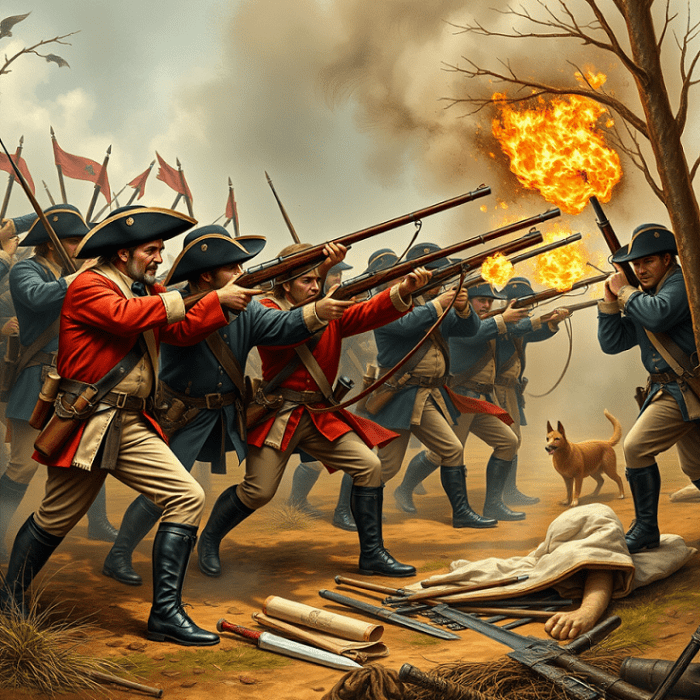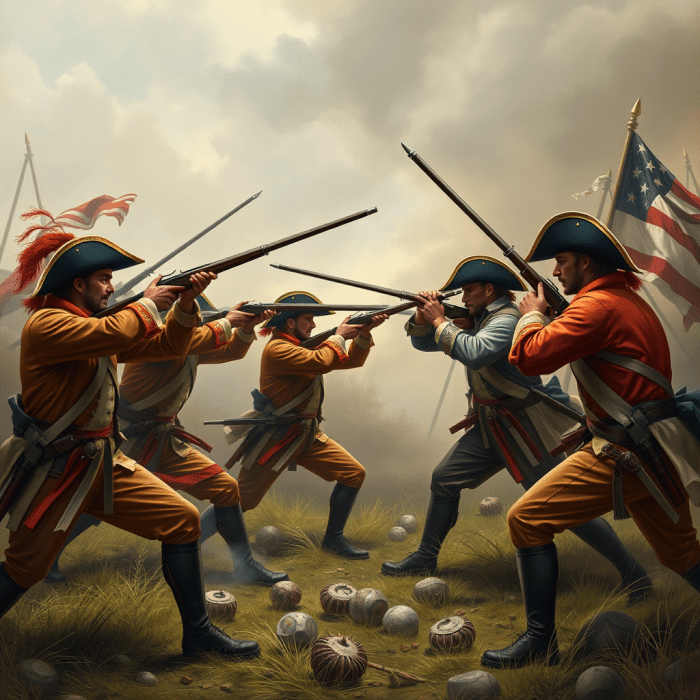The primary cause of the War of 1812 was a continuous struggle between the United States and Great Britain, fueled mostly by British intervention in American trade and shipping.
The British Royal Navy’s practice of impressment, or compelling American sailors into British military service, enraged the United States.
Britain’s limitations on American commerce with France during the Napoleonic Wars, as well as its backing for Native American resistance to US development in the Northwest Territory, exacerbated tensions.
The United States saw these activities as an infringement of its sovereignty. Economic constraints, national pride, and a desire to demonstrate American independence prompted Congress to declare war in 1812.
Read also: Spanish America War Weapons–Explained
How Did the War of 1812 Start and End
The War of 1812 began on June 18, 1812, when the United States declared war on Britain due to issues like trade restrictions, impressment of American sailors, and British support of Native American resistance.
The war officially ended on February 17, 1815, with the ratification of the Treaty of Ghent, which restored pre-war boundaries without resolving many of the initial disputes. The war was fought for two years and eight months.
The Significance of the War of 1812 to America.
The War of 1812 solidified American independence, proving the young nation could stand against Britain. It fostered national pride, exemplified by the defense of Fort McHenry, inspiring the “Star-Spangled Banner.” The war weakened Native American resistance in the Northwest Territory, opening land for American expansion.
Economic impacts led to increased domestic manufacturing, reducing reliance on foreign goods. The war also propelled figures like Andrew Jackson to national prominence, influencing future U.S. politics.
Despite unresolved territorial disputes, the conflict marked a turning point in American self-confidence, shaping the nation’s identity and confirming its sovereignty on the global stage.

The Major Effects of the War of 1812
The War of 1812 had three major effects on the United States: national pride, economic growth, and weakened Native American resistance. The war boosted national pride as Americans saw themselves capable of standing up to Britain again, solidifying a sense of national identity.
Iconic events, like the defense of Fort McHenry, inspired symbols such as “The Star-Spangled Banner,” fostering unity and patriotism.
Economic growth emerged as a significant outcome, driven by the disruption of trade with Britain, which forced the U.S. to rely on domestic manufacturing. This shift spurred the early stages of American industrialization, reducing dependence on European goods and leading to economic diversification.
The war’s blockade prompted the establishment of factories and increased self-sufficiency, laying the groundwork for the Industrial Revolution in the United States.
Weakened Native American resistance was another critical effect, as Native alliances with the British were devastated. Key battles, such as the defeat of Tecumseh’s confederation, opened up vast territories in the Northwest for American settlement.
This loss of Native American power accelerated westward expansion, altering the demographic and political landscape of the United States. These combined effects of increased nationalism, economic independence, and territorial expansion shaped America’s path toward becoming a more unified and self-reliant nation.
Also Read: Mexican American War Uniform Pictures-Updated
The War Of 1812 And America Expansion
The War of 1812 directly contributed to American expansion by weakening Native American resistance and removing British influence in the Northwest Territory. Before the war, Native American tribes, often supported by the British, actively resisted U.S. settlers moving west.
The defeat of Tecumseh’s confederation and other Native alliances during the war dismantled organized resistance, opening vast areas in the Midwest for American settlement.
The war also ended British support for Native tribes, eliminating a major obstacle to westward expansion. Treaties signed after the conflict, such as the Treaty of Ghent, recognized American control over disputed territories, reducing foreign interference.
With Native opposition weakened and British influence diminished, settlers poured into the fertile lands of Ohio, Indiana, Illinois, Michigan, and beyond.
The conflict also boosted national confidence, reinforcing the belief in Manifest Destiny—the idea that the United States was destined to expand across the continent. The surge in nationalism encouraged Americans to push westward, fueled by opportunities for farming, trade, and new settlements.
The victory against Britain reaffirmed U.S. sovereignty, emboldening the government and citizens to pursue territorial growth without fear of foreign intervention. The war thus set the stage for rapid territorial expansion, fundamentally reshaping the nation’s geographic and political landscape.

Impact of the War of 1812 on U.S. Military Development
The War of 1812 significantly impacted American military development by exposing weaknesses in training, leadership, and organization. The conflict highlighted the need for a standing army, professional officer corps, and a stronger navy, leading to military reforms and modernization efforts.
Poor coordination and inadequate defenses during the war prompted the establishment of the U.S. Military Academy at West Point, enhancing officer training. Naval successes, such as victories by the USS Constitution, spurred investments in shipbuilding and naval strategies.
These changes laid the foundation for a more structured, capable, and prepared military, shaping America’s future defense capabilities.
The Outcome of The War of 1812
The War of 1812 ended with the Treaty of Ghent in 1814, restoring pre-war boundaries between the United States and Britain without territorial gains for either side. The conflict resolved few of the issues that sparked the war, such as impressment and trade restrictions.
It boosted American nationalism, proved the U.S. could defend itself, and diminished Native American resistance, facilitating westward expansion.
The war also led to increased respect for the U.S. on the global stage, strengthened American manufacturing due to trade disruptions, and marked the end of major military hostilities between the U.S. and Britain.
Also Read: States Involved in the American Civil War-Explained
Long-term Consequences of the War of 1812
The long-term consequences of the War of 1812 included a strengthened sense of American nationalism and identity, fostering a period of national unity and pride. Economically, the war stimulated domestic manufacturing by disrupting trade with Britain, and accelerating industrial growth.
It also led to a significant decline in Native American resistance, facilitating westward expansion and settlement across the continent.
The conflict diminished British influence in North America, setting the stage for improved U.S.-British relations. Additionally, the war prompted military reforms, including the establishment of the U.S. Military Academy at West Point, enhancing future military readiness and professionalism.
Conclusion
The War of 1812 affirmed American independence, bolstered national pride, and accelerated economic and military development. It weakened Native American resistance, paving the way for westward expansion.
Despite unresolved issues, the conflict fostered a sense of unity and self-reliance, shaping the future trajectory of the United States.